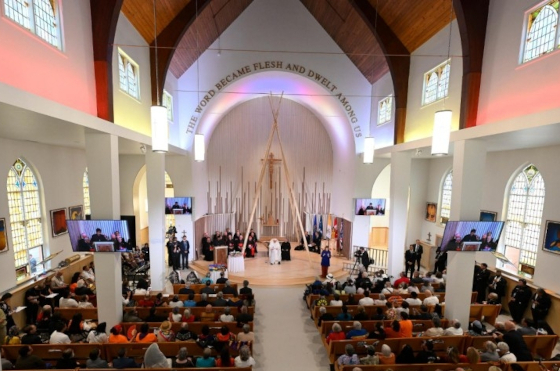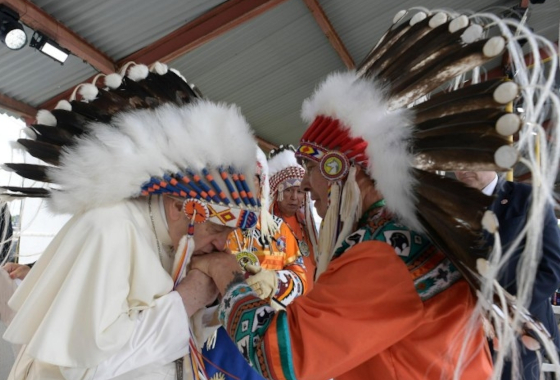
Reflections on Vancouver, British Columbia and other topics, related or not
Speaking penitence to power
Did Pope Francis bolster ideological
fervour more than Christian faith?
Greg Klein | August 5, 2022
Francis delivered his strongest Christian affirmation
to the Sacred Heart parish in Edmonton. Overwhelming it,
however, were his platitudes and apologies.
(All photos: Vatican Media)
“Questo lavoro che è genocida… era un genocidio… è stato un genocidio.” Genocide, genocide, genocide. That’s what emotionally manipulative journalists and rapacious race hustlers most want to hear. And that was Pope Francis’ final word on the subject of native residential schools at the end of last month’s Apostolic Journey to Canada.
True, the comments came in an off-the-cuff response to a race-baiting reporter. But in one of his formal speeches in Quebec Francis did offer legitimacy to the “genocide”-pumping Truth and Reconciliation Commission, as well as other fashionable secular causes. His frequent and repetitive apologizing, moreover, distinguished his visit more than anything else.
Yet Francis did encourage greater aspirations. Although media paid little or no attention, he spoke emphatically in his July 25 address to Sacred Heart Church in Edmonton. (Transcripts of the Pope’s speeches and press conferences can be found here.)
Departing from his well-publicized give-’em-what-they-want-to-hear remorse, Francis defined the otherwise (and, for victimology, advantageously) undefined word “reconciliation.”
Referring to Ephesians 2:14, Francis said, “The Apostle Paul tells us that Jesus reconciles by bringing together, by making two distant groups one: one reality, one soul, one people. And how does he do that? Through the cross.”
Later he quoted Colossians 1:20. On the cross, Jesus accomplished God’s plan “to reconcile all things.”
The speech at times followed his pattern of either romanticizing or pitying natives. But Francis spoke more directly in this passage:
If we truly want to be reconciled with one another and with ourselves, to be reconciled with the past, with wrongs endured and memories wounded, with traumatic experiences that no human consolation can ever heal, our eyes must be lifted to the crucified Jesus; peace must be attained at the altar of his cross. For it is precisely on the tree of the cross that sorrow is transformed into love, death into life, disappointment into hope, abandonment into fellowship, distance into unity. Reconciliation is not merely the result of our own efforts; it is a gift that flows from the crucified Lord, a peace that radiates from the heart of Jesus, a grace that must be sought.
He criticized missionaries who tried to impose Christianity in a manner contrary to the faith (a recurring problem recognized by missionaries and clergy in different parts of the world during different historical periods). But his definition of “reconciliation” implicitly defied race-hustling extortion.
Francis delivered his strongest apology at Maskwacis.
Media reports say natives rejected it.
Even his most lengthy apology, as he began his penitential pilgrimage in Maskwacis, Alberta on July 25, ended with this: “Our own efforts are not enough to achieve healing and reconciliation: we need God’s grace.”
His final speech, in Iqaluit on July 29, implicitly broached a subject that’s taboo in native issues: self-responsibility.
Addressing young Inuit, he quoted Goethe: “That which you inherited from your fathers, must first be earned before it can become yours.” In his own words, Francis continued: “It is not enough to live off the past, it is necessary to earn what was given to you as a gift.”
Again implicitly, obliquely, he seemed to call on young people to rise above historical grievances. Continuing the theme with a Christian perspective the speech was, after Edmonton, Francis’ strongest exhortation to faith.
But too often his subtlety got lost amid more obvious and stereotypical liberal mush. So if his message was missed, can the public be blamed?
His apostolic apologies were hardly the Church’s first on this issue. Francis visited in response to calls—demands, even—by native spokespeople for yet another apology, here in Canada, on a greater public scale and more fulsome than ever. Francis largely complied. Yet his penitence was thoroughly rejected by pretty well every native quoted by media.
That being the case, what would he have lost by emphasizing Christian responsibility over collective self-pity and self-righteousness? At times he tried, but only implicitly and while burying that message in bathos that further empowers and enriches aboriginals, already Canada’s most powerful ethnic groups. Then he compounded the race-hustling advantage with his last-minute impromptu imprimatur for the monstrous redefinition of “genocide.”
It might take hubris to suggest that the Pope downplayed subtle Christian messages in deference to an anti-Christian ideological fervour. But, at the twilight of the West, it’s especially despairing to imagine a church that seems as wracked with guilt as any Hollywood-conditioned lost soul. Was that really the legacy of Pope Francis’ Apostolic Journey to Canada?

